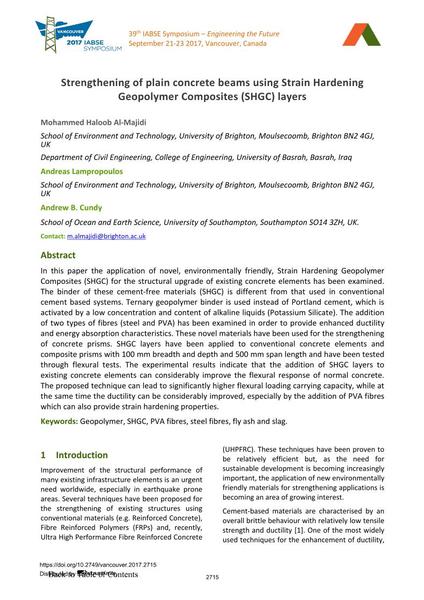Strengthening of plain concrete beams using Strain Hardening Geopolymer Composites (SHGC) layers

|
|
|||||||||||
Détails bibliographiques
| Auteur(s): |
Mohammed Haloo Al-Majidi
Andreas Lampropoulos Andrew B. Cundy |
||||
|---|---|---|---|---|---|
| Médium: | papier de conférence | ||||
| Langue(s): | anglais | ||||
| Conférence: | IABSE Symposium: Engineering the Future, Vancouver, Canada, 21-23 September 2017 | ||||
| Publié dans: | IABSE Symposium Vancouver 2017 | ||||
|
|||||
| Page(s): | 2715-2722 | ||||
| Nombre total de pages (du PDF): | 8 | ||||
| Année: | 2017 | ||||
| DOI: | 10.2749/vancouver.2017.2715 | ||||
| Abstrait: |
In this paper the application of novel, environmentally friendly, Strain Hardening Geopolymer Composites (SHGC) for the structural upgrade of existing concrete elements has been examined. The binder of these cement-free materials (SHGC) is different from that used in conventional cement based systems. Ternary geopolymer binder is used instead of Portland cement, which is activated by a low concentration and content of alkaline liquids (Potassium Silicate). The addition of two types of fibres (steel and PVA) has been examined in order to provide enhanced ductility and energy absorption characteristics. These novel materials have been used for the strengthening of concrete prisms. SHGC layers have been applied to conventional concrete elements and composite prisms with 100 mm breadth and depth and 500 mm span length and have been tested through flexural tests. The experimental results indicate that the addition of SHGC layers to existing concrete elements can considerably improve the flexural response of normal concrete. The proposed technique can lead to significantly higher flexural loading carrying capacity, while at the same time the ductility can be considerably improved, especially by the addition of PVA fibres which can also provide strain hardening properties. |
||||
